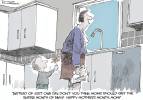The savings rate and taxes
In his weekly radio and Internet address Saturday, President Barack Obama pointed out what many economists have been saying for years: Since healthy economic growth depends on the ability of entrepreneurs and capitalists to borrow, and since (barring a dangerously inflationary policy that just prints new money out of thin air) banks and stock markets have money to loan and invest only if someone first saved that money, America needs a higher savings rate.
And some of the ideas President Obama proposed Saturday make good sense.
The president proposed making it easier for small companies to set up tax-deferred 401(k) retirement savings plans in which all workers are automatically enrolled unless they "opt out." Contribution levels would then be automatically increased over time, though workers could still raise or lower their own contribution levels, or "opt out" entirely.
And workers leaving their jobs would be allowed to direct unused vacation pay into their retirement savings accounts rather than taking it in cash.
These ideas are fine, though the recurring use of the word "allowed" highlights a major problem. Why do workers and their employers need federal permission for all this stuff?
The problem is that the IRS rides jealous herd over such tax-deferred savings plans, lest too many taxes get ... well, deferred.
Minority Republicans have tried for years to get the 401(k) caps increased or removed, so wage earners can set aside more than a paltry few thousand dollars a year into tax-deferred savings accounts. The president's party will have none of it, apparently fearing this would allow the "well-to-do" to save too much, while leaving Uncle Sam with too little.
Which is it, Mr. President? We're supposed to save more ... but still "not too much"?
Unfortunately, what the president said Saturday also runs counter to a lot of things this administration has actually been doing, often in the name of "economic stimulus" -- offering Americans big cash or interest subsidies if they'll run out and buy a new car, or a new house, rather than salting that money away in the bank.
But the biggest obstacle to savings is taxes, plain and simple. When Social Security and Medicare withholding taxes, local sales taxes and all the rest are added to the personal income tax, many American wage-earners kiss 40 percent of their earnings goodbye before they can even consider putting it away for a rainy day.
The steps Mr. Obama proposed Saturday do not require congressional action. Most are worth a try. Though one -- allowing people to check a box on their federal tax returns asking that any refund be sent as a U.S. savings bond -- is at least goofy, if not dangerous.
The interest paid on such bonds does not keep up with the current, government-caused rate of inflation. Does the president think it's going to help his personal credibility, or that of Washington, to recommend a bad investment?
Besides, how long will it be before the savings bond option is also made "opt-out" -- if not outright mandatory?























